|
|
|
Sort Order |
|
|
|
Items / Page
|
|
|
|
|
|
|
| Srl | Item |
| 1 |
ID:
161958
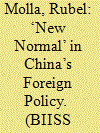

|
|
|
| 2 |
ID:
107185
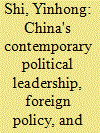

|
|
|
|
|
| Publication |
2011.
|
| Summary/Abstract |
There have been several profound features embedded in the contemporary Chinese political leadership, all having their roots in the Chinese centuries-long traditions or the modern/contemporary creative practice, together with their shaping impacts upon China's foreign policy or remarkable reflections in her external behavior. They are: reforms inherently differentiated; central idea of "maintenance", notion of "biological circle governing universe", paradox in the question of equality, the emphasis on morality, overwhelmingly domestic function of foreign policy, firm belief in the Chineseness per sue and its overwhelming importance, and political prudence in the perennial context of "Strong China, Weak China." China is facing enormous domestic historical challenges and substantial international pressure, while a generally peaceful China can be assured at least from her self-regarding realistic perspective.
|
|
|
|
|
|
|
|
|
|
|
|
|
|
|
|
| 3 |
ID:
174735
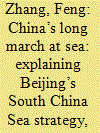

|
|
|
|
|
| Summary/Abstract |
Does China have a strategy toward the South China Sea? I test three hypotheses about Chinese strategy—regional hegemony, gray-zone coercion, and bureaucratic politics—against seven major developments in Chinese policy between 2009 and 2016. None of these hypotheses offers an accurate or complete explanation of Chinese strategy. I argue that China has a dialectic and arduous strategy of balancing the goals of safeguarding rights and maintaining stability. But such a balance is inherently dynamic and frequently elusive. It was not until after 2016 that Beijing began to master the art of strategic balance and achieve an upper hand in the long struggle over the South China Sea.
|
|
|
|
|
|
|
|
|
|
|
|
|
|
|
|
| 4 |
ID:
152942
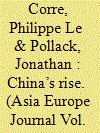

|
|
|
|
|
| Summary/Abstract |
This essay examines and evaluates China’s global rise and the state of the transatlantic discussions about this issue. Since 2010, the rise of China has been accompanied by multiple Chinese initiatives on the international front, especially in the fields of trade and investment. Chinese overseas direct investments are on the rise at a global level. The creation of the Asian Infrastructure Investment Bank, of the Silk Road Fund, and of the “Belt and Road” initiative are signs of a much more assertive China that is now engaging Western countries, including Europe and the USA. Western reactions, both at governmental and grass-root levels have been mixed. Two questions emerge: can Europeans agree on a common policy toward China? And can the USA and the European Union pursue a dialog and a more coordinated strategy? This will be especially relevant in the context of President Donald Trump’s administration as well as newly elected governments in France and Germany following general elections in these countries in 2017. The future of a transatlantic dialog should also encompass the British question when the UK leaves the EU. As the USA and leading European countries map their foreign policy strategies in coming years, there is a need to elevate policy coordination toward China in the hierarchy of political and economic goals. The paper offers some suggestions on possible priorities.
|
|
|
|
|
|
|
|
|
|
|
|
|
|
|
|
| 5 |
ID:
107167
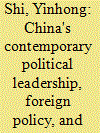

|
|
|
|
|
| Publication |
2011.
|
| Summary/Abstract |
There have been several profound features embedded in the contemporary Chinese political leadership, all having their roots in the Chinese centuries-long traditions or the modern/contemporary creative practice, together with their shaping impacts upon China's foreign policy or remarkable reflections in her external behavior. They are: reforms inherently differentiated; central idea of "maintenance", notion of "biological circle governing universe", paradox in the question of equality, the emphasis on morality, overwhelmingly domestic function of foreign policy, firm belief in the Chineseness per sue and its overwhelming importance, and political prudence in the perennial context of "Strong China, Weak China." China is facing enormous domestic historical challenges and substantial international pressure, while a generally peaceful China can be assured at least from her self-regarding realistic perspective.
|
|
|
|
|
|
|
|
|
|
|
|
|
|
|
|
| 6 |
ID:
137620
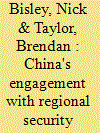

|
|
|
|
|
| Summary/Abstract |
Using a case study of Beijing’s participation in the Shangri-La Dialogue, a prominent annual security gathering in Singapore, this article analyses China’s approach to Asian security multilateralism. It does so by developing and employing a typology consisting of four characterizations of multilateral engagement: China as “blocker”; China as “socialized participant”; China as “shaper”; and China as “opportunistic participant”. The article shows that in its approach to the Shangri-La Dialogue, China displays all four of these traits, while noting that some are more prevalent and compelling at certain points in time. It uses this finding to draw conclusions about Beijing’s future engagement with the Shangri-La Dialogue and its broader approach to security multilateralism. It also contributes to the larger debate over whether China is a “revisionist” or a “status quo” rising power.
|
|
|
|
|
|
|
|
|
|
|
|
|
|
|
|
| 7 |
ID:
153028
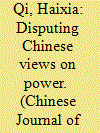

|
|
|
|
|
| Summary/Abstract |
The concept of power, a keyword in International Relations (IR) theory, has long polarized academic attention in China. In the 1990s and early 21st century, many Chinese academics concentrated their energies on gauging the comprehensive national power of major world powers. But, in contrast to their foreign peers, Chinese scholars have tended to underestimate China’s comprehensive national power. In the first decade of the 2000s, soft power superseded comprehensive national power as a main focus of attention in China’s academia, and variations in China’s foreign policy accompanied this shift of scholarly focus. Traditional policies such as ‘keeping a low profile’ and ‘never seek hegemony’ were questioned, while new slogans, such as ‘be a responsible great power’ and ‘peaceful rise’ gained more support. The study of Chinese scholars’ perception of power is helpful for understanding China’s foreign policy choices.
|
|
|
|
|
|
|
|
|
|
|
|
|
|
|
|
| 8 |
ID:
175856
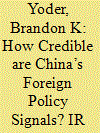

|
|
|
|
|
| Summary/Abstract |
Scholars and policymakers currently lack systematic criteria for determining the credibility of China's foreign policy signals, which has produced widely divergent conclusions about its likely intentions. ‘China optimists’ view China’s cooperative signals as credible, while dismissing its noncooperative behaviors as unrepresentative of its broader preferences. Conversely, ‘China pessimists’ see China’s cooperative signals as non-credible misrepresentation and focus on China’s recent ‘assertive’ behavior. Drawing on theoretical scholarship on signaling and credibility in international relations, this article introduces general deductive criteria for assigning credibility to a rising state’s foreign policy signals. It then applies these criteria to evaluate the specific Chinese signals that optimists and pessimists have cited in support of their respective positions. The analysis finds that both optimists and pessimists have overlooked multiple conditions that have reduced the credibility of China’s cooperative and noncooperative foreign policy signals alike. This implies that far more uncertainty about China’s intentions is warranted than has been acknowledged on either side of the current debate.
|
|
|
|
|
|
|
|
|
|
|
|
|
|
|
|
| 9 |
ID:
193186


|
|
|
|
|
| Summary/Abstract |
Since the outbreak of the COVID-19 pandemic, the authorities of Serbia have undertaken a concerted effort to secure China’s support in containing the coronavirus. This asymmetrical cooperation, apart from aspects concerning health security, has allowed both sides to obtain considerable political and economic benefits. This article examines how China and Serbia utilize pandemic cooperation to pursue and realize their wider foreign and internal policy goals through patron–client ties, as well as highlighting the pitfalls of this kind of relationship. Although the outbreak of the pandemic and the medical cooperation that followed do not constitute a turning point in the well-established relations between the two countries, the article argues that pandemic cooperation has considerably strengthened relations. In many ways, the pattern observed by the authors resembles China’s pandemic exchanges with other countries, especially smaller states with authoritarian inclinations.
|
|
|
|
|
|
|
|
|
|
|
|
|
|
|
|
| 10 |
ID:
110795
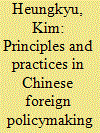

|
|
|
|
|
| Publication |
2012.
|
| Summary/Abstract |
This article explains principles and practices in China's foreign policy decisionmaking-and their implications for its policy toward South Korea. The author
argues that more serious attention should be paid to "democratic centralism" as a
guiding principle of decision-making, even in foreign affairs. This principle
favors consensus-building, coordination, and compromise in policymaking. As a
result, China often suffers time-wastage and inertia on non-routine issues in its
policymaking, which is quite different from the image of the top-down model.
Reflecting the structure of Chinese policymaking, China's foreign policies are more
likely to be risk averse, conservative, and prone to following status-quo policies.
China prefers the status quo to renovation of its Korea policy. Instead of taking
any new initiatives, China's foreign policy toward the Korean peninsula is likely to
adhere to its current policy priority of maintaining stability on the Peninsula. It is
also noteworthy that China may gradually depart from its slow and reactive foreign
policies to more proactive ones. As China becomes more capable of processing
non-routine issues, while making them routine ones, more proactive policies will
be realized although the gradual nature of Chinese decision-making is expected to
remain intact for the time-being.
|
|
|
|
|
|
|
|
|
|
|
|
|
|
|
|
| 11 |
ID:
114903
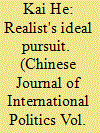

|
|
|
|
|
| Publication |
2012.
|
| Summary/Abstract |
It is no exaggeration to say that Yan Xuetong's Ancient Chinese Thought,
Modern Chinese Power is a path-breaking project that integrates ancient
Chinese philosophy, Pre-Qin history, and contemporary International
Relations (IR) theory. Although Yan has not introduced a new grand
theory of IR in the book per se, he has paved a fresh theoretical and intellectual path to reforming current, western-philosophy-and-history-based IR
theory. If scholars follow Yan's guidance and approach as laid out in the
book, it will be no surprise to see developed more than one new IR theory.
|
|
|
|
|
|
|
|
|
|
|
|
|
|
|
|
| 12 |
ID:
113618
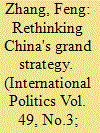

|
|
|
|
|
| Publication |
2012.
|
| Summary/Abstract |
The question of China's grand strategy is of great importance for understanding the international impact of China's rise. Both Western and Chinese scholars dispute whether China has developed a coherent grand strategy in the reform era. The main reason for the controversy seems to lie as much in theoretical and methodological assumptions about defining and analyzing grand strategy as in empirical validity. This article contributes to the debate by adopting a novel theoretical approach to analyzing grand strategy by seeing it as the conjunction of national interests and strategic ideas. It examines China's evolving national interests and strategic ideas in the reform period in order to clarify the exploratory, evolutionary and adaptive nature of policy change. China cannot be said to have developed a premeditated grand strategy during this period. Even though one may still be able to rationalize elements of China's foreign policies into a grand strategy, it comes at the cost of missing their changing nature.
|
|
|
|
|
|
|
|
|
|
|
|
|
|
|
|
| 13 |
ID:
138961
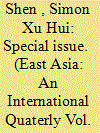

|
|
|
|
|
| Summary/Abstract |
Coinciding with the rise of Chinese economy, China’s foreign policy has become more assertive than ever. As part of the “Chinese Dream” promise, her new projects, the “New Maritime Silk Road” and the “New Silk Road,” have created a new chapter of China’s relations with her neighboring countries as well as the international communities. However, China’s hidden agenda of the two new projects, her challenges of achieving her goals, and how the international communities respond to the increasingly assertive Chinese foreign policy are yet to be discussed extensively among research on international relations. This introduction seeks to outline a wide spectrum of theoretical framework that is applicable to the subject and to highlight the importance of understanding the context of China’s strategic shifts in Xi Jinping’s era.
|
|
|
|
|
|
|
|
|
|
|
|
|
|
|
|
| 14 |
ID:
137625


|
|
|
|
|
| Summary/Abstract |
This article critically analyses an intuitive and influential conceptual framework by which to understand state strategy in territorial conflicts. According to this framework, a state in a territorial dispute can pursue one of three general strategies: threaten or use force; offer territorial concessions; or delay. This article argues that it is problematic to regard these three candidate strategies as mutually exclusive. It is argued that not only can a strategy of escalation be compatible with one of delay, but many uses of force can be employed instrumentally in service of delaying. The framework, this article contends, does not so much capture “strategy” as it does certain aspects — or outcomes — of strategy, which while appropriate for certain analytical tasks is less so for others. The 2012 Scarborough Shoal incident is examined and China’s strategy during the event is scrutinized with a view towards assessing the strengths and weaknesses of applying the framework to an analysis of narrower scope. Lastly, it is argued that a framework for conceptualizing state strategy in territorial disputes should not be confined to three alternatives; it should be more broadly constructed, allowing for more nuance and taking seriously all the domains of statecraft.
|
|
|
|
|
|
|
|
|
|
|
|
|
|
|
|
|
|
|
|
|